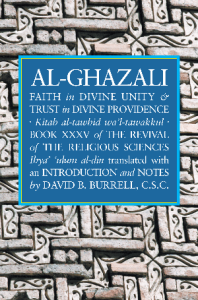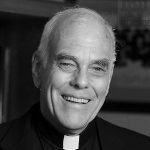Al-Ghazali on Faith in Divine Unity & Trust in Divine Providence (Ihya Ulumuddin Series No. 35)

Author: Imām Al-Ghazali
Translator: David B. Burrell
Publisher: Fons Vitae Publishing
Year of Publication: 2001
Print Length: 175 pages
Genre: Islamic Studies / Quranic Studies; Theology, Ethics and Philosophy; Science, Reflection & Self-Development; Qur’anic Reflection, Supplication & Prayers; Non-Fiction / Religious Studies
Topic: Allah ﷻ, Prophet Muhammad ﷺ, Islam, Qur’an, Human Nature & Character, Human Psyche, Islamic Psyche, Aqidah/Creed, Ethics & Morality, Spirituality
In an axial volume from his celebrated compendium, the “Ihya ulum al din“, al-Ghazali shares his startling and original exploration of the meaning of trust in Divine Providence and recommends specific spiritual skills to help the seeker develop a state whereby he or she may rightly respond to events as they happen. This judicious use of stories is intended to imitate the Sufi practice of the master/disciple relationship, where the novice is helped to discern correct action.
Table of Contents
Abbreviations
Preface
Introduction
Notes to Introduction
FAITH IN DIVINE UNITY AND TRUST IN DIVINE PROVIDENCE
Prologue: Explicating the Benefits of Trust in Divine Providence
The First Part
Explicating the Nature of Faith in Divine Unity [tawḥīd] as the Foundation of Trust in Divine Providence [tawakkul]
Notes to the First Part
The Second Part
States of Trust in Divine Providence with Accompanying Practices
1. Explicating the State of Trust in Divine Providence
2. Explanation of What [Sufi] Sheiks Have Said about the States of Trust in Divine Providence
3. Explanation of the Actions of Those Who Trust in Divine Providence
3.1. On obtaining something beneficial which people lack
3.1.1. On obtaining what is beneficial for single persons
3.1.2. Explaining the trust in divine providence proper to heads of families
3.1.3. Using a parable to clarify the states of those who trust in God while depending on means
3.2. Attending to means by saving
3.3. On making use of means to repel injury and resist danger
3.3.1. Explanation of the conduct of those who trust in divine providence when their goods are stolen
3.4. On the effort to remove harm, as in treatment of disease and similar things
3.4.1. Explaining that dispensing with treatment belongs to some states and demonstrates the power of God, and how that does not contradict the practice of the messenger of God—may God’s blessing and peace be upon him
3.4.2. Explanations countering those who say that foregoing treatment is more beneficial in every case
3.4.3. Explaining the states of those who trust in God with regard to disclosing or concealing illness
Notes to the Second Part
Appendix: Persons Cited in Text
Bibliography

Imām Abu Hamid al-Ghazali is a 11th century Muslim scholar. He was one of the most prominent and influential philosophers, theologians, jurists, and mystics of Sunni Islam. Al-Ghazālī was born at Ṭūs (near Mashhad in eastern Iran) and was educated there, then in Jorjān, and finally at Nishapur (Neyshābūr), where his teacher was al-Juwaynī, who earned the title of imām al-ḥaramayn (the imam of the two sacred cities of Mecca and Medina). He was active at a time when Sunni theology had just passed through its consolidation and entered a period of intense challenges from Shiite Ismâ’îlite theology and the Arabic tradition of Aristotelian philosophy (falsafa). Al-Ghazâlî understood the importance of falsafa and developed a complex response that rejected and condemned some of its teachings, while it also allowed him to accept and apply others. His great work, Iḥyāʾ ʿulūm al-dīn or Ihya Ulumuddin (“The Revival of the Religious Sciences”), made Sufism (Islamic mysticism) an acceptable part of orthodox Islam.
Source: https://plato.stanford.edu/entries/al-ghazali/
More from Imam al-Ghazali in this library, click here.

David B. Burrell is a retired Theodore M. Hesburgh Professor of Philosophy and Theology at the University of Notre Dame, USA. In 1980, he served for one year as Rector at the Ecumenical Institute for Advance Theological Studies in Tantur, Israel before teaching at Notre Dame College in Dhaka, Bangladesh until 1982. From 1982-2006, Burrell returned to the University of Notre Dame to teach. From 2006-2012, Burrell taught at the Uganda Martyrs University in Kampala, Uganda, and from 2012-2013 taught at Tangaza College in Nairobi, Kenya. In 2013 he was assigned to live in Dhaka, Bangladesh, where he remained until he moved to Holy Cross House, Notre Dame, Ind. for health reasons. He passed away in October 2023 after a short illness.
Source: https://www.southbendtribune.com/obituaries/psbn0585534
More from David B. Burrell in this library, click here.
